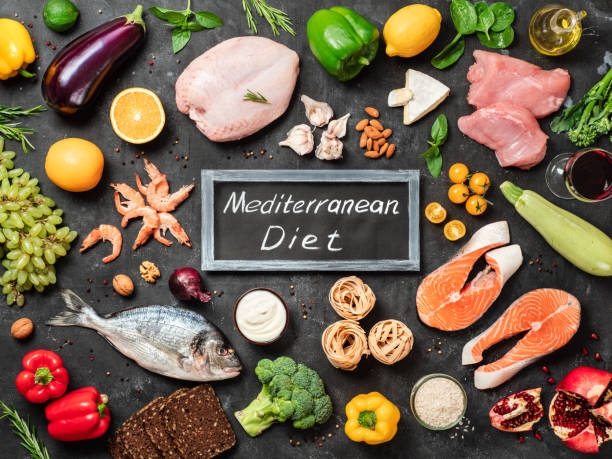The Mediterranean diet has long been lauded as a healthy eating plan, backed by extensive research that supports its many health-promoting benefits. Unlike many fad diets, it is not restrictive or rigid, allowing for ample flavor and variety while still promoting good health.
What is the Mediterranean Diet?
The Mediterranean diet is inspired by foods commonly consumed in the Mediterranean region, such as whole grains, nuts, legumes, healthy fats, fruits and veggies, fish and poultry. Red meat and highly processed foods are limited. Red wine and dairy products are included (in moderation).
Benefits of the Mediterranean diet
Over the years, many studies have shown that following the Mediterranean diet has numerous health benefits, including:
Improved heart health
This diet is associated with a reduced risk of heart disease due to consuming foods that are low in saturated and trans fats, and high in healthy fats like monounsaturated and polyunsaturated fats.
Lower risk of type 2 diabetes
This diet emphasizes whole, unprocessed foods that are low in added sugars and refined carbohydrates, which can cause spikes in blood sugar levels.
Reduced risk of cancer
The Mediterranean diet is rich in antioxidants, which can help protect against cancer. Additionally, it includes plenty of fruits, vegetables, and whole grains, which are all associated with a lower risk of various types of cancer.
Improved cognitive function
Studies have shown that following the Mediterranean diet may help improve cognitive function, especially in older adults. This is because it is rich in healthy fats and antioxidants, which can help protect the brain from damage.
Better weight management
It has been shown to help people maintain a healthy weight. This is because it emphasizes whole, unprocessed foods that are low in calories and high in fiber, which can help keep you feeling full and satisfied.
Improved gut health
This diet is high in fiber, which can help improve gut health by promoting the growth of healthy gut bacteria. This can help reduce the risk of digestive issues like constipation, diarrhea, and inflammatory bowel disease.
How to Get Started?
To get started with the Mediterranean diet, make small, manageable shifts to your diet. For example, swapping out red meat for fish or using herbs and spices instead of salt can be a good starting point. Here are some ideas for breakfast, lunch, dinner, snacks, and dessert you can try:
Breakfast Ideas
- Mediterranean breakfast bowl, featuring hard-boiled egg, cheese, hummus, cucumbers, and tomatoes
- Avocado toast with poached eggs, whole-grain bread, sliced avocado, and tomato, accompanied by 100% pure orange juice and/or a cup of coffee with limited added sugar and fat
Lunch Ideas
- Mixed greens salad with tomatoes, red onions, cucumbers, chickpeas, grilled chicken, olive oil, and balsamic vinegar
Dinner Ideas
- Pasta dish with vegetables and protein, such as sautéed spinach, chopped garlic, and grilled shrimp
- Snack and Dessert Ideas
- Small apple paired with almonds
- Strawberries topped with whipped cream
- Lemon sorbet topped with fresh mint
The Mediterranean Diet Shopping List
To make shopping for ingredients easier, consider adding the following staples to your grocery list:
- Olive oil
- Eggs
- Nuts, such as walnuts or almonds
- Salmon or canned sardines
- Avocados
- Canned or dried beans
- Fresh fruit
- Fresh vegetables
- Whole grains
- Greek yogurt
The Mediterranean diet provides a balanced and delicious way of eating that can be beneficial to health in a variety of ways. By incorporating these tips and meal ideas, and working out at Crunch Fitness regularly, you can make the transition to a better, healthier lifestyle.
